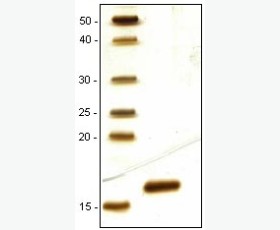Recombinant Human VEGF-D/FIGF
| Product name: | Recombinant Human VEGF-D/FIGF |
| Source: | Human Cells |
| Purity: | Greater than 95% as determined by reducing SDS-PAGE. |
| Buffer Formulation: | Lyophilized from a 0.2 μm filtered solution of 20mM PB, 150mM NaCl, pH 7.4. |
| Applications: | Applications:SDS-PAGE; WB; ELISA; IP. |
| Storage: | Avoid repeated freeze/thaw cycles. Store at 2-8 oC for one month. Aliquot and store at -80 oC for 12 months. |
| UOM: | 100ug/50ug/200ug/1mg/1g |
| Source | Human Cells |
| Description | Recombinant Human Vascular Endothelial Growth Factor D is produced by our Mammalian expression system and the target gene encoding Phe93-Ser201 is expressed with a 6His tag at the C-terminus. |
| Names | Vascular Endothelial Growth Factor D, VEGF-D, c-Fos-Induced Growth Factor, FIGF, VEGFD |
| Accession # | O43915 |
| Formulation | Lyophilized from a 0.2 μm filtered solution of 20mM PB, 150mM NaCl, pH 7.4. |
| Shipping |
The product is shipped at ambient temperature. |
| Reconstitution |
Always centrifuge tubes before opening. Do not mix by vortex or pipetting. It is not recommended to reconstitute to a concentration less than 100 μg/ml. Dissolve the lyophilized protein in ddH2O. Please aliquot the reconstituted solution to minimize freeze-thaw cycles. |
| Storage |
Lyophilized protein should be stored at < -20°C, though stable at room temperature for 3 weeks. Reconstituted protein solution can be stored at 4-7°C for 2-7 days. Aliquots of reconstituted samples are stable at < -20°C for 3 months. |
| Purity |
Greater than 95% as determined by reducing SDS-PAGE. |
| Endotoxin | Less than 0.1 ng/µg (1 IEU/µg) as determined by LAL test. |
| Amino Acid Sequence |
FYDIETLKVIDEEWQRTQCSPRETCVEVASELGKSTNTFFKPPCVNVFRCGGCCNEESLICMNTS TSYISKQLFEISVPLTSVPELVPVKVANHTGCKCLPTAPRHPYSHHHHHH
|
| Background | Vascular endothelial growth factor D (VEGF-D) is a member of the platelet-derived growth factor/vascular endothelial growth factor (PDGF/VEGF) family. It is highly expressed in lung, heart, small intestine and fetal lung, and at lower levels in skeletal muscle, colon, and pancreas. VEGF-D is growth factor active in angiogenesis, lymphangiogenesis and endothelial cell growth, stimulating their proliferation and migration and also has effects on the permeability of blood vessels. It may function in the formation of the venous and lymphatic vascular systems during embryogenesis, and also in the maintenance of differentiated lymphatic endothelium in adults. It undergoes a complex proteolytic maturation, generating multiple processed forms that bind and activate VEGFR-2 and VEGFR-3 receptors. |














